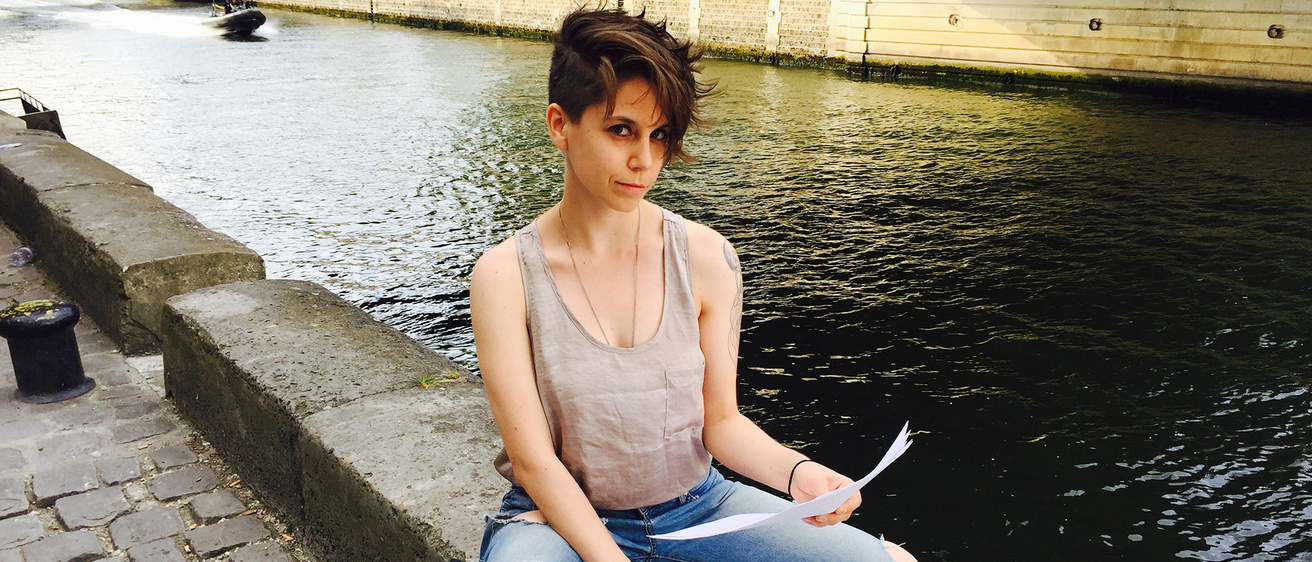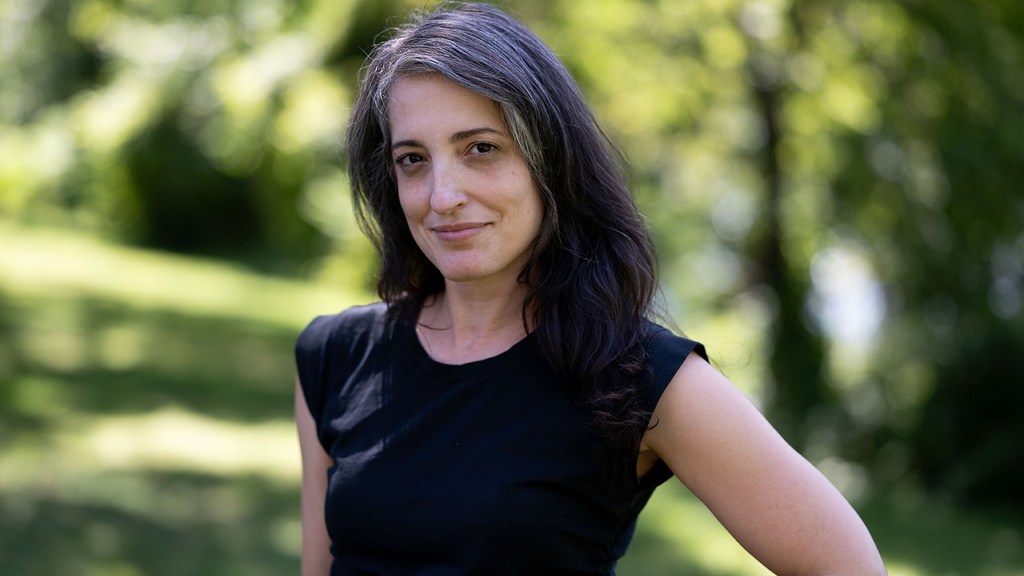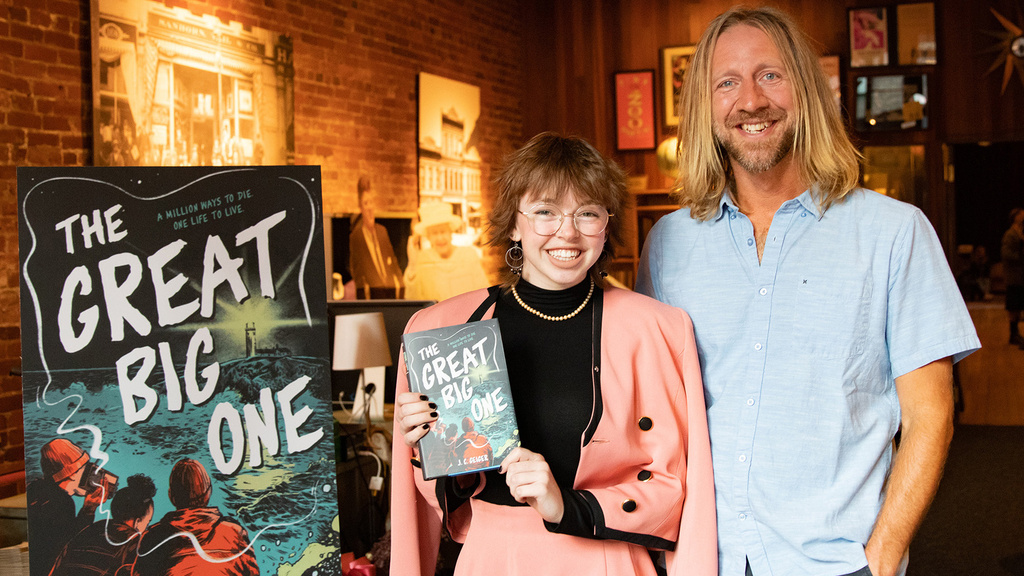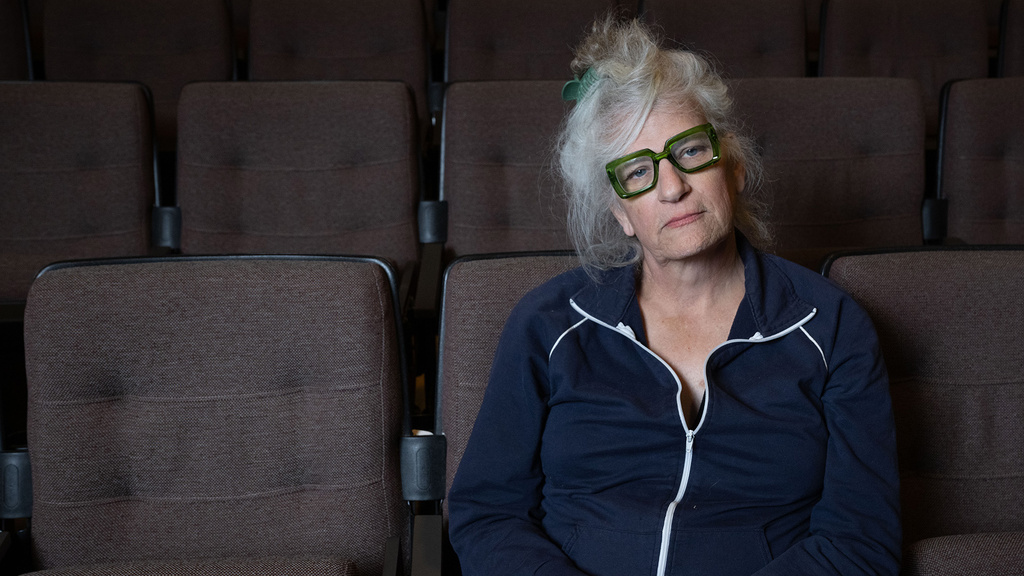Theater audiences around the world are becoming pretty familiar with Jen Silverman. The graduate from the Iowa Playwrights Workshop has been named one of the nation’s top 20 most-produced playwrights the last two years. And she’s not stopping with the stage, also penning books, TV series, and films.
Story: Emily Nelson
Photography: Dane Laffrey (portrait) and Jeff Lorch (for "Witch at the Geffen")
Published: Oct. 29, 2019
The magazine American Theatre each year collects season programming from theaters across the country and crunches the numbers to tally the top 20 most-produced playwrights—other than Shakespeare, because otherwise there would never be any mystery about who would be No. 1.
Longtime theater mainstay and University of Iowa graduate Tennessee Williams has appeared on the list every year it’s been published, but he’s been joined the past two years by a fellow Hawkeye: Jen Silverman.
Since earning her MFA from the Iowa Playwrights Workshop in 2011, Silverman’s plays have put her on the international map, having been produced in theaters across the U.S. and as far off as Australia.
Alan MacVey, professor in the Department of Theatre Arts and director of the Division of Performing Arts, was co-teaching the Playwrights Workshop when Silverman was a first-year graduate student. He recognized her talent immediately.
“Jen turned in her first play to me and after two pages I knew she was somebody,” MacVey says. “Her voice was distinctive, her characters were oddballs but relatable, and she had an extraordinary imagination. She was, and is, a free artist. There’s a saying that art makes the strange familiar and the familiar strange. That fits Jen Silverman to a T. It was my privilege to work with her as she was setting out on a great career. It’s my pleasure to see her succeed.”
Silverman is a member of New Dramatists, and an affiliated artist with The Playwrights Center, New Georges, and SPACE on Ryder Farm. She has also developed work with the O’Neill, New York Theatre Workshop, Playpenn, The Ground Floor Residency at Berkeley Rep, and the Royal Court in London, among others. Some of her most-recently produced plays include Wink, The Roommate, Witch, and The Moors.
Writing is all Silverman says she ever wanted to do.
“The plot twist is that I thought I’d be a novelist,” Silverman says. “I didn’t grow up going to the theater, so I didn’t really know what it was. I found my way into playwriting at Brown, under Paula Vogel, and it took me another decade to get back to prose.”
Random House in 2018 published her first book, The Island Dwellers, a collection of interconnected stories, and she recently turned in a second draft of her first novel to her editor. She’s also written for TV and film, most recently on Netflix’s Tales of the City.
As Iowa prepares to present Silverman’s Bonnets: (How Ladies of Good Breeding Are Induced to Murder) Nov. 15–16 as part of its Workshop Series, Silverman talks about her experience at Iowa and where she finds inspiration for her stories.
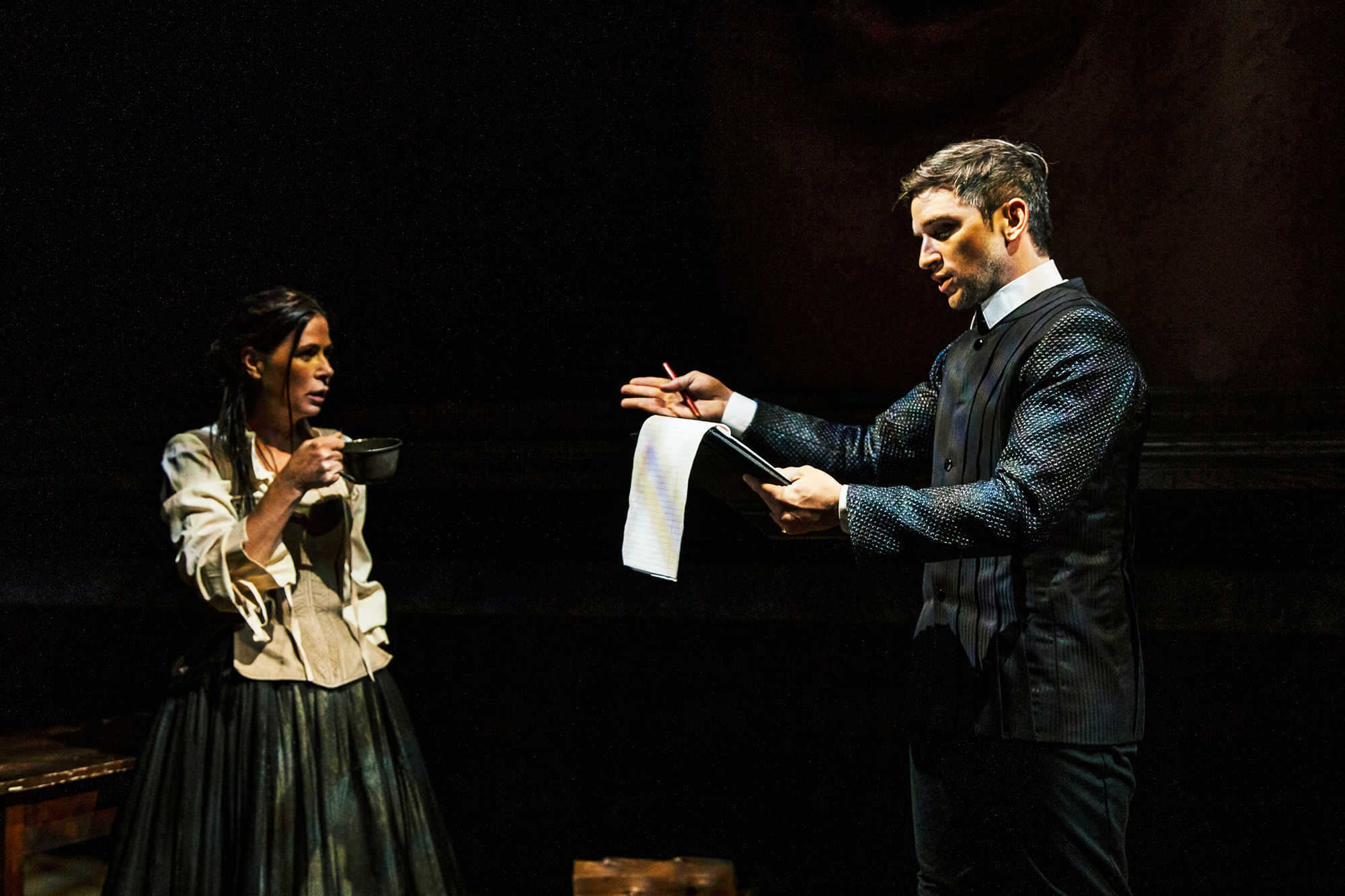
Maura Tierney and Evan Jonigkeit perform in “Witch,” written by University of Iowa alumna Jen Silverman. In her “Los Angeles Times” review, Margaret Gray writes, “Silverman’s dialogue accomplishes so much, so succinctly, that it establishes itself right away as the biggest star of the Geffen Playhouse’s starry production.”
Why did you choose Iowa for your MFA in playwriting?
I chose the Playwrights Workshop in part because of its reputation for turning out artists who are wildly different from each other—in tone, in aesthetic, in subject matter. I think part of the joy of having a pedagogical model that combines a steady faculty presence with a constant influx of working playwrights is that you don’t end up sounding like anybody but yourself in the end. You’re exposed to so many possible mentors, you have the chance to grow in so many directions.
Iowa is also one of the few programs that really gives students the opportunity to test their work on its feet with collaborators. There are so many chances to produce work. When I was in school, we had the Gallery Series and the Iowa New Play Festival, and then there were all of these other opportunities that people made happen throughout the year. I remember going to a classmate’s play in a found space above a bar; I remember another set of artists made a play where you’d walk through Iowa City listening to headphones and hearing the story unfold around you.
There was this incredible sense of curiosity, exploration, creativity. Nobody was at the mercy of trying to write something “producible” or economically savvy. It was a protected, self-selected space in which you ended up with a lot of really weird and remarkable thinkers who were trying to get to the bottom of what theater could be and why to make it at all.
Were there people at Iowa who particularly inspired you?
Alan MacVey was a real mentor for me. I would bring him early drafts of plays and we’d sit down and talk about them. I learned so much from how rigorous he is with text—how he’d interrogate what the script was doing, what it was attempting, where it faltered. Alan changed the way I thought about what I was doing. The fact that he believed in me and my work, that he took it so seriously, was immeasurably important to me.
Dare Clubb is a deeply curious independent thinker, and so much of what I learned from him was how to take a play on its own merits—for exactly what it is doing, not what you think it should be doing. He and Art Borreca introduced me to a wide variety of theater-makers that I’d never encountered. David Adjmi and Naomi Wallace came in to teach workshops in my first year of grad school, and both of them shaped how I think of theater and politics.
My classmates were also hugely influential to me, and still are—Kevin Artigue, Jess Foster, Andrew Saito, and dramaturge Christine Scarfuto. And two classes ahead, Mary Hamilton, and two classes below, Basil Kreimendahl. Christine and I have worked on a number of my new plays together since Iowa. Kevin and Mary just got into New Dramatists, where Basil and I are doing fellowships. Basil and I are currently in the middle of a collaboration. We’re all still intertwined in each other’s work.
Iowa Playwrights Workshop
The University of Iowa’s MFA Program in Playwriting is an intensive three-year program dedicated to educating playwrights and collaborative theater artists who will lead the American theater in the creation of new works. The Playwrights Workshop seeks to create conditions in which artists can develop their unique voice while freely experimenting with a variety of creative processes and theatrical forms.
Where do you find inspiration for characters, locations, and storylines?
I have certain things I’m obsessed with. I moved around a lot as a child—raised in a lot of countries—and that might be how I developed an interest in how people transform and adapt. And I read a lot—fiction, essays, poetry. I try to keep my head in work other people are making, especially when it isn’t the medium that I’m working in at the moment.
But also, just paying attention to what’s happening around me becomes a process of constant questioning—asking about what is happening, and then trying to look underneath that to why it’s happening, and what pre-existing, embedded structures are perpetuating it. And theater is such an amazing medium for asking hard questions.
You’ve been named one of the 20 most-produced playwrights the last two years by American Theatre. What do you think it is about your work that people are drawn to?
I think the answer to that is so variable, honestly. My work often has a queer, feminist lens. It often uses dark comedy to ask difficult questions. It’s always character-driven. It’s often absurdist. It tends to be a little strange, a little askew. It tends toward structural shape-shifting, moments of wild theatricality—songs, dances, rituals. Things that remind us we’re all in a theater together, that can’t exist the same way in other media. I am obsessed with questions of transformation, agency, power. Can we change, as people or societies? To what extent? Are we shaped by our legacies? What does reinvention look like?
I think when audiences resonate with one or a few of those things, sometimes they respond to my work. And then, of course, sometimes they don’t. And for me that’s the whole delicious thing of theater: if you hear me, I’m talking to you. If you don’t hear me, there are a bunch of different playwrights out there who might be your people. We each need to find and witness the plays that were made for us, and that we were made for.
What projects are you currently working on?
They’re varied at the moment. I’m working on a couple of screenplays for various studios, and I’m in development for two TV shows. I’m in edits for my first novel for Random House, and I’ve been working for the last several years on a play called Witch. We premiered it in Chicago, it got a second production this summer at the Geffen Playhouse in Los Angeles, and now I’m figuring out how to fix a few of the places in the script that still flag for me before it goes on to its next production and before Samuel French publishes it.
Do you have a dream project you’d love to dig into one day?
I’ve been—very slowly, during TV staffing jobs, long flights, and tech—drawing a tarot deck of existentially depressed pandas. Someday I hope to finish.
Do you have a favorite author, book, or play—or is there one you wish more people knew about?
Sarah Kane and Caryl Churchill got me into the theater. I read their plays and thought, “Oh, if this is what theater is, I’m all in.” I love writers Richard Yates and Maggie Nelson; poets Kaveh Akbar, Rebecca Lindenberg, and Richard Siken; filmmakers Yorgos Lanthimos, Takashi Miike, Hirokazu Kore-eda, and Wong Kar-wai. I just started reading this incredible young poet, Nico Amador. Everyone should be reading him.
Nurturing artists of promise at Iowa
While at the University of Iowa, Jen Silverman was in part supported by a graduate teaching assistant appointment. She also received scholarship assistance from three sources:
- The Barry and Margaret Kemp Scholarship for graduate playwrights;
- The Norman Felton Scholarship for graduate playwrights; and
- The Marcus Bach Fellowship, a competitive, endowed fellowship offered through the College of Liberal Arts and Sciences to support the completion of an MFA project or doctoral dissertation.
What advice would you give students who are interested in a career in playwriting—or any type of writing?
Read everything, see everything. For a while. In fields and forms you don’t create, as well as the ones you do. And then get really, really specific about the work that feels like it was made exactly for you—the work that makes you feel like you are the only person in the world who understands it. The people making that work are your fellow travelers. Learn from them.
